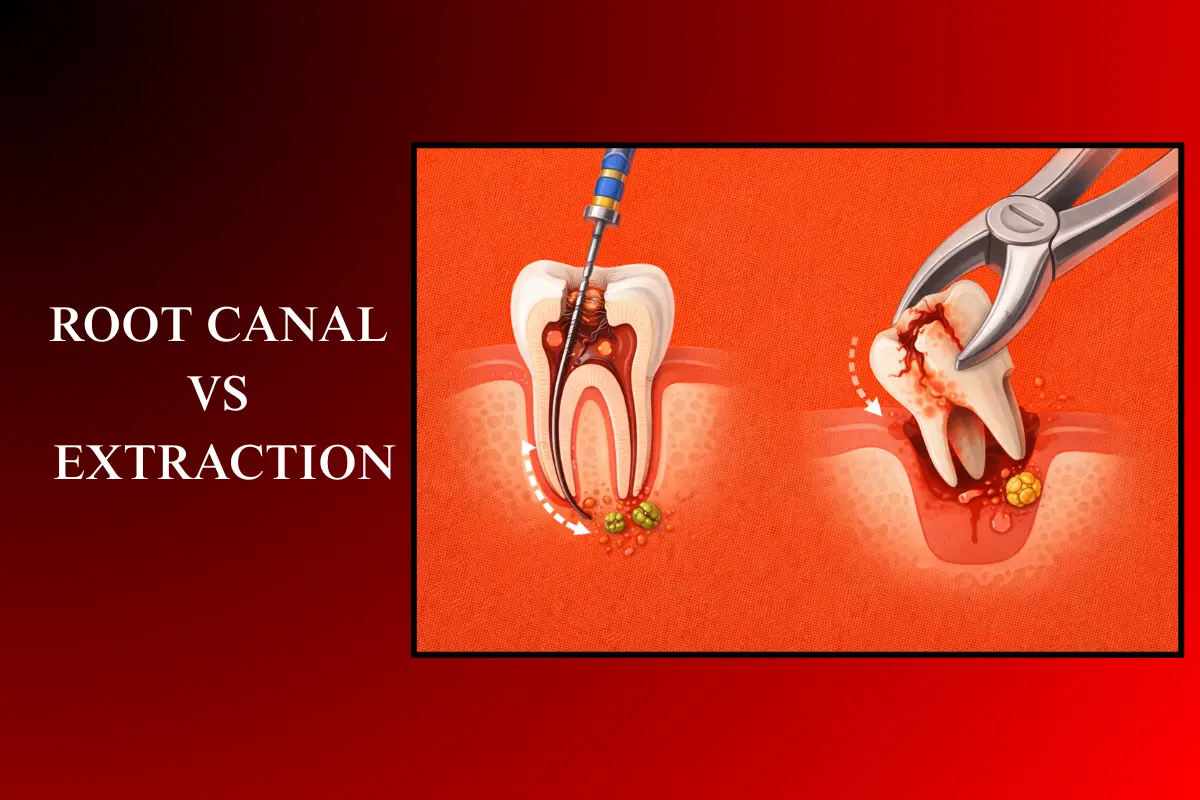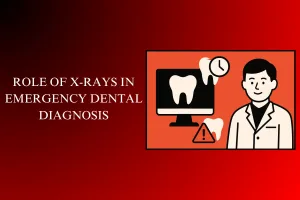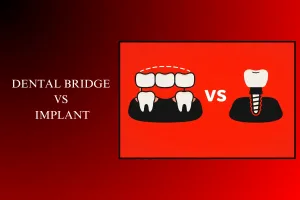Severe tooth pain, infection, or deep decay often leaves patients with two choices, save the tooth with a root canal or remove it with an extraction. But which one is the better choice? The answer isn’t always straightforward. The right option depends on your dental health, long-term consequences, and cost considerations.
This guide breaks down the key differences, pros and cons, pain levels, recovery time, and long-term effects so you can make an informed decision.
Short Summary
- Severe tooth pain or infection often requires either a root canal or tooth extraction.
- A root canal preserves your natural tooth, maintains jawbone health, and prevents teeth from shifting.
- Extraction removes the damaged tooth and eliminates infection but can lead to bone loss and bite issues if not replaced.
- Recovery and pain are generally manageable for both, though extraction may cause more post-procedure discomfort.
- The right choice depends on tooth condition, long-term oral health, and overall cost.
Root Canal vs. Extraction: A Quick Comparison
| Factor | Root Canal | Tooth Extraction |
|---|---|---|
| Purpose | Saves the natural tooth by removing infection | Removes the damaged/infected tooth |
| Pain Level | Minimal pain (local anesthesia used) | More discomfort post-procedure |
| Healing Time | 1–2 weeks | 1–2 weeks (full gum healing in months) |
| Cost in the UK | £300 – £1,000+ | £50 – £350 (without replacement) |
| Long-Term Effect | Preserves tooth and jawbone health | It can cause bone loss and shifting of teeth |
Understanding Root Canal Treatment
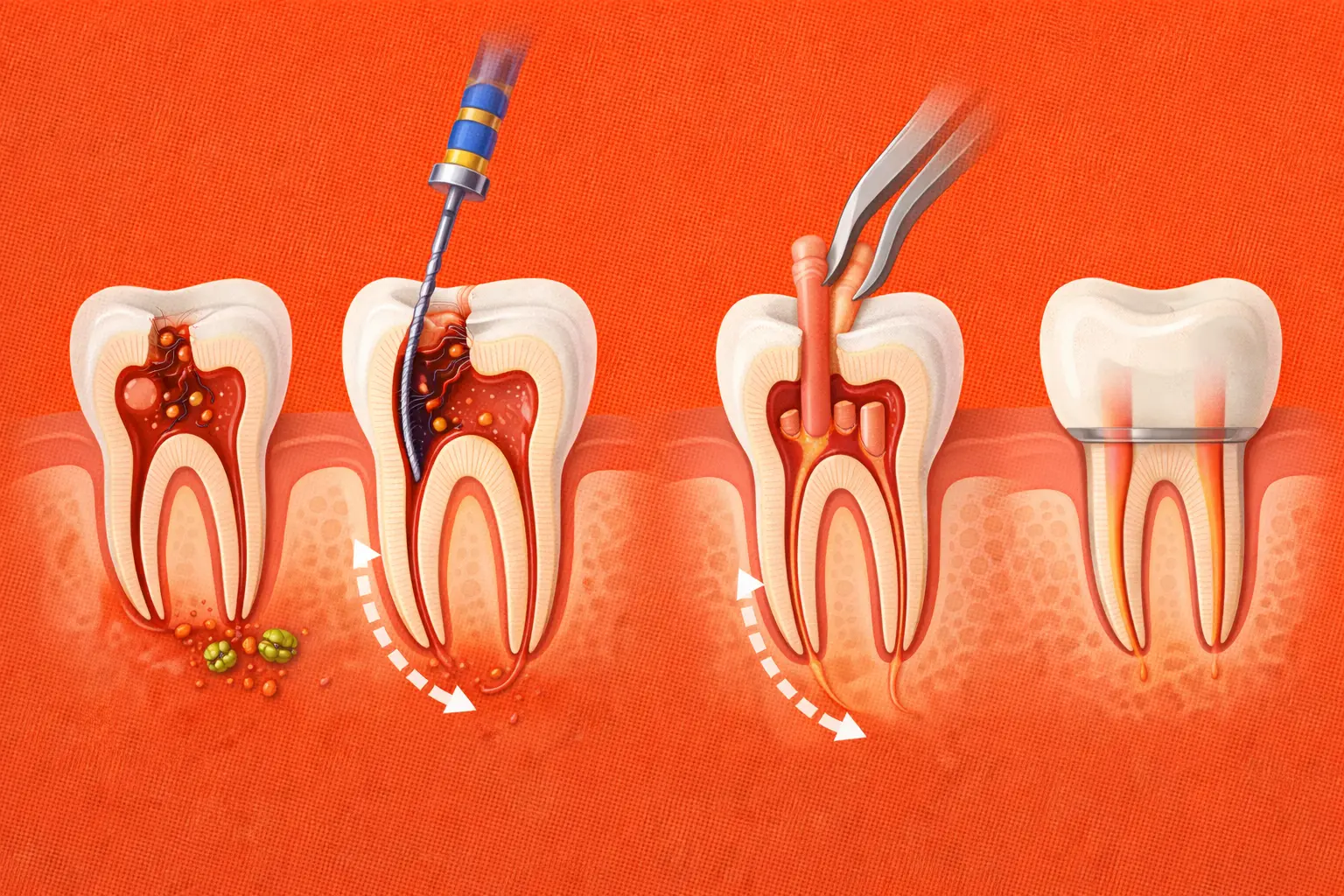
A root canal is a procedure to save a severely damaged tooth by removing the infected pulp, cleaning the inside, and sealing it with a crown. It’s an excellent alternative to extraction when the tooth structure is still intact.
When Is a Root Canal Recommended?
- Deep cavities reaching the tooth’s nerve but still salvageable
- Cracked or broken teeth that can be restored
- Infections or abscesses that haven’t spread beyond the tooth
- Sensitivity to hot and cold that doesn’t go away
Pros of a Root Canal
- Preserves your natural tooth
- Less painful than extraction in the long run
- Prevents teeth from shifting and causing bite problems
- More cost-effective than implants or bridges
Cons of a Root Canal
- Higher upfront cost (£300 – £1,000)
- The tooth may weaken over time and require a crown
- Not suitable for severely damaged teeth
Understanding Tooth Extraction
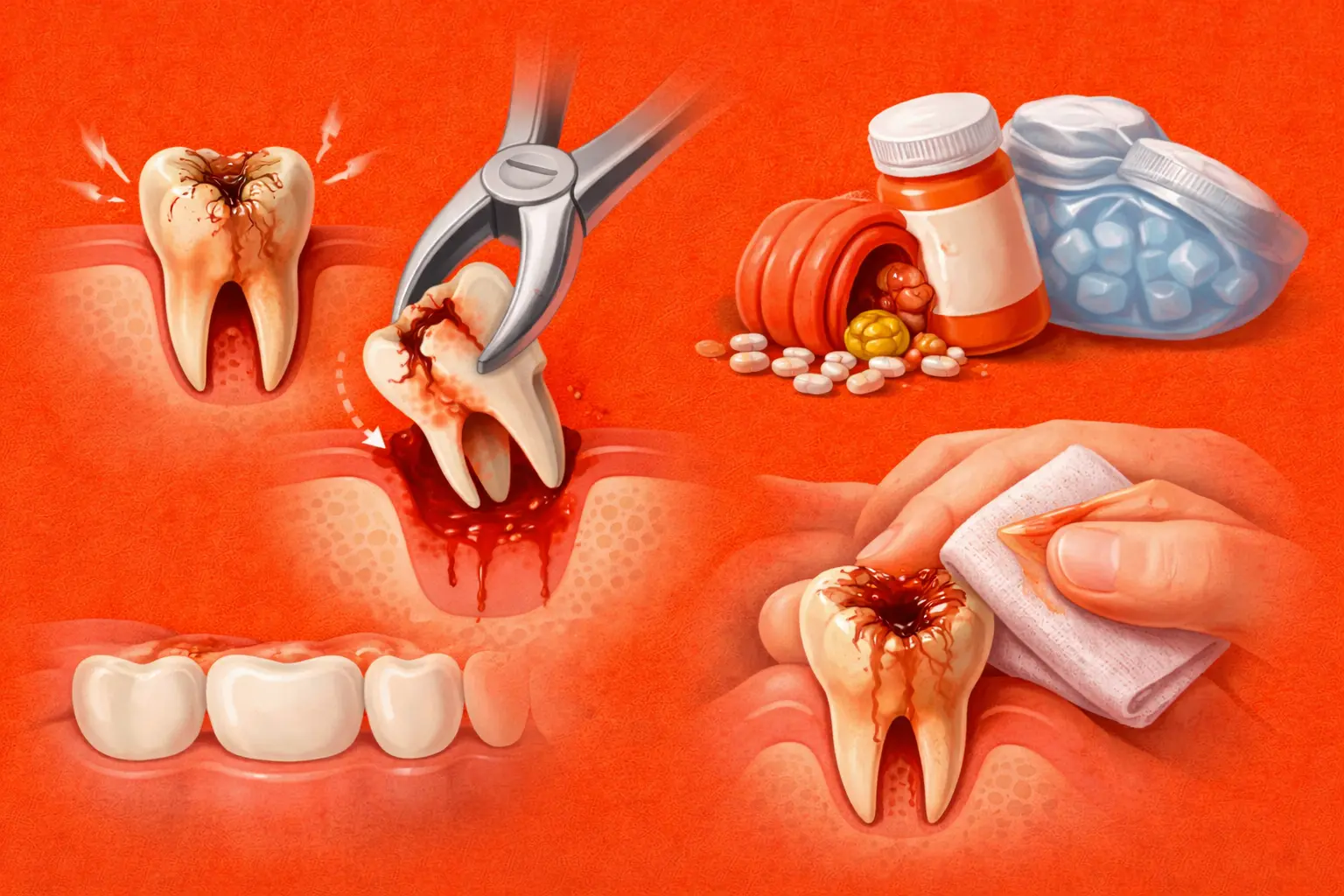
If the tooth is too damaged to be saved, tooth extraction is the only option. The dentist removes the tooth entirely, and depending on the location, you may need a replacement (implant, bridge, or denture) to maintain oral function.
When Is Tooth Extraction Necessary?
- Severe decay that extends beyond the root
- Broken tooth below the gum line
- Extensive infection that has spread to the bone
- Impacted wisdom teeth causing pain or crowding
Pros of Tooth Extraction
- Removes the infection entirely
- Quick procedure (usually 30–60 minutes)
- Lower initial cost (£50 – £350)
Cons of Tooth Extraction
- It can cause bone loss in the jaw over time
- Teeth may shift, affecting your bite and alignment
- May require additional treatments
Pain & Recovery: What to Expect
One of the biggest concerns for patients is pain and healing time.
1. Pain Level
- Root Canal: Modern techniques and anesthesia make this procedure virtually painless. Any soreness afterward is mild and manageable with painkillers.
- Extraction: The procedure itself is painless due to anesthesia, but post-procedure discomfort is typically higher than a root canal. Swelling and soreness can last a few days to a week.
2. Recovery Time
- Root Canal: Most patients return to normal activities within a day or two. The tooth is fully restored after a crown placement.
- Extraction: Healing can take a few weeks, and complete bone regeneration may take several months.
Long-Term Effects: What Happens Years Later?
Your decision impacts your dental health in the long run.
- Root Canal: The tooth remains functional, preventing bone loss or misalignment.
- Extraction: Over time, missing teeth can cause the jawbone to shrink, leading to sagging facial structure or bite issues.
If you opt for an extraction, a dental implant is the best solution to prevent complications.
Cost Comparison: Is a Root Canal or Extraction Cheaper?
At first glance, extraction is cheaper—but when considering long-term costs, the root canal is often the better investment.
A root canal in the UK typically costs between £300 – £1,000, depending on the complexity of the procedure and whether it’s done privately or through the NHS. If successful, there are usually no further costs, making it a cost-effective long-term solution.
Extraction is more affordable upfront, ranging from £50 – £350. However, if you plan to replace the missing tooth with a dental implant, the cost can exceed £2,000, making it a more expensive option in the long run.
Root Canal vs. Extraction: Which One Should You Choose?
When to Choose a Root Canal
A root canal is the best option if the tooth can still be saved. It allows you to keep your natural tooth, maintain your bite, and avoid jawbone loss. If the infection is limited to the inside of the tooth and can be treated, a root canal is usually the better long-term solution.
When to Choose an Extraction
Extraction is necessary when the tooth is beyond repair due to severe decay, deep fractures, or extensive infection that has spread too far. If you’re prepared for a replacement, such as an implant or bridge, removal may be the right choice. However, leaving the gap untreated can lead to bone loss and shifting teeth.
However if you are still unsure? Let our experts at Night and Day Emergency Dentist evaluate your case and recommend the best option.
Schedule Your Visit!Final Verdict: Which Is Better?
- If the tooth is salvageable, → Root Canal is the best choice for long-term health.
- If the damage is too severe → Extraction is necessary, but consider dental implants or bridges to prevent further issues.
FAQs – Root Canal or Extraction
Conclusion
Choosing between a root canal and tooth extraction depends on your dental health and long-term goals. A root canal saves your natural tooth, while an extraction removes the problem but may require a replacement to prevent future issues.
If you’re unsure, our team at Night and Day Emergency Dentist can help you make the best decision for a healthy, lasting smile.
